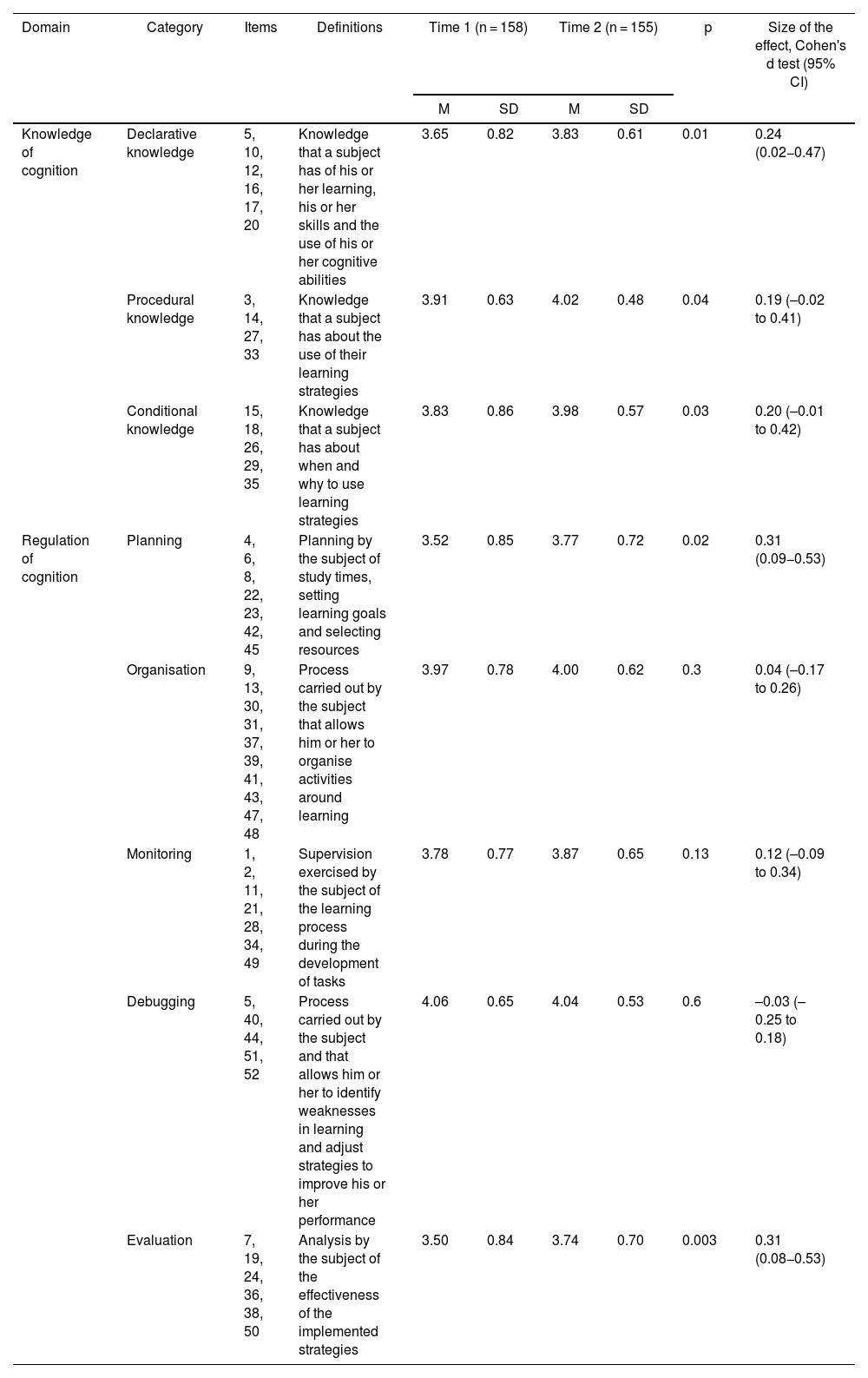The evidence regarding the effects of the Inverted Classroom on students' metacognitive skills is limited. This study evaluates these effects on student perceptions about knowledge and cognitive regulation during a surgical course.
MethodsWe measured student perceptions before and after a conventional Inverted Classroom in surgery using the Metacognitive Awareness Inventory. We evaluated the mean differences between the scores of the two measurements using Student’s t-test (p < 0.05), and the size of the effect on knowledge and cognitive regulation using Cohen’s d test (95%CI).
ResultsA total of 158 students (pre-intervention) and 155 students (post-intervention) were included in the analysis. Significant differences were found (p < 0.05) in, as well as positive effects on, the students’ abilities to know their own learning (declarative knowledge) (d = 0.24; 95%CI, 0.02−0.47), to use learning strategies (procedural knowledge) (d = 0.19; 95%CI, –0.02 to 0.41) and to understand when and why to use these strategies (conditional knowledge) (d = 0.20; 95%CI, –0.01 to 0.42), in addition to the abilities to plan (d = 0.31; 95%CI, 0.09−0.53) and to evaluate their learning (d = 0.31; 95%CI, 0.08−0.53).
ConclusionsThe Inverted Classroom has positive effects on metacognitive skills according to students’ perceptions. Further studies are required that compare these effects with other methodologies for teaching in the classroom and the workplace.
La evidencia sobre los efectos del Aula Invertida en las habilidades metacognitivas de los estudiantes es escasa. El presente estudio evalúa estos efectos en las percepciones estudiantiles acerca del conocimiento y la regulación cognitiva durante un curso de cirugía.
MétodosLas percepciones estudiantiles se midieron antes y después de un Aula Invertida convencional en cirugía, utilizando el Metacognitive Awareness Inventory. Las diferencias de medias entre las puntuaciones de las 2 mediciones se evaluaron mediante la prueba de la t de Student (p < 0,05) y el tamaño del efecto en el conocimiento y la regulación cognitiva, mediante la prueba de la d de Cohen (IC95%).
ResultadosSe incluyó en el análisis a 158 (grupo preintervención) y 155 estudiantes (posintervención). Se encontraron diferencias significativas (p < 0,05) y efectos positivos en las habilidades estudiantiles para conocer el propio aprendizaje (conocimiento declarativo) (d = 0,24; IC95%, 0,02-0,47), emplear estrategias de aprendizaje (conocimiento procedimental) (d = 0,19; IC95%, –0,02 a 0,41) y entender cuándo y por qué utilizar dichas estrategias (conocimiento condicional) (d = 0,20; IC95%, –0,01 a 0,42). Además, sobre las capacidades para planificar (d = 0,31; IC95%, 0,09-0,53) y evaluar su aprendizaje (d = 0,31; IC95%, 0,08-0,53).
ConclusionesEl Aula Invertida tiene efectos positivos en las habilidades metacognitivas según las percepciones estudiantiles. Se requieren nuevos estudios que comparen estos efectos con otras metodologías de enseñanza en el aula y el sitio de trabajo.






